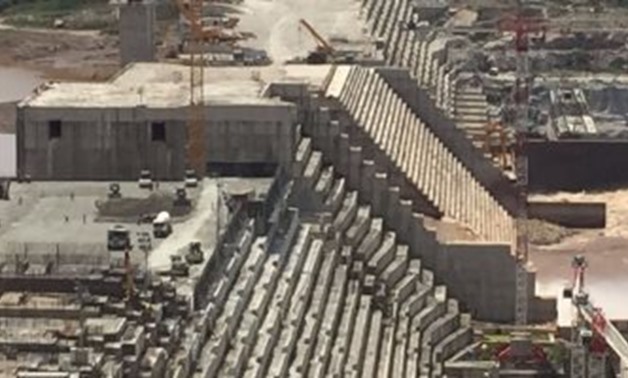
Renaissance Dam – File Photo
CAIRO – 18 October 2017: “Egypt is concerned about the delay of the technical studies recommended by the International Panel of Experts,” said Minister of Water Resources and Irrigation, Mohamed Abdel-Ati, during the opening session of the Tripartite National Committee.
“Egypt is committed to a tripartite joint cooperation agreement in Khartoum on March 23, 2015, between Egypt, Sudan and Ethiopia to facilitate all measures necessary for ending the study,” stressed Abdel-Ati.
Abdel-Ati stressed that more commitments and pledges should be made to end the study assessing the hydrological, environmental, and economic impact of the mega project on the downstream countries.
“We face a difficult situation as we sign a contract with consultant firms in September 2016 to conduct studies, but we have not agreed on the preliminary report of the consultant firm yet,” noted Abdel-Ati.
The negotiation in the two previous meetings held in May and September failed due to unresolved points in Ethiopia’s plan to build the first stage of the dam. Consequently, Egypt called for signing a fixed timetable to implement the clauses of the contract and to prevent further delays in the studies.
During his speech, Abdel-Ati thanked Ethiopia for organizing a visit to the construction area of the Grand Ethiopian Renaissance Dam; adding that endorsing the preliminary report will help specialists finish the studies.
“Today’s meeting proves the three states’ good intentions in solving any disagreements and helping the consultants implement the measures needed to end the study,” Abdel-Ati stated; hoping that these meetings will bear fruitful results as they are held in critical moments.
Since the beginning of the dam's construction in 2011, the upstream countries, Egypt and Sudan, opposed the technical studies of the dam as it would decrease their share in the Nile water resources by 55.5 billion cubic meters and 18.5 billion cubic meters respectively.
However, Ethiopia denies that other downstream countries will be adversely affected by the dam and the prospect of war was raised in 2013 and 2014.
President Abdel Fatah al-Sisi signed a tripartite joint cooperation agreement in Khartoum on March 23, 2015, between Egypt, Sudan and Ethiopia. The three countries held 14 rounds of consultation on resolving the disputes over the Renaissance Dam. However, these rounds failed to solve the dispute.
Consequently, the Nile Basin countries asked the French firm Artelia Group to join the French consulting group BRL Ingénierie in 2016, while they study the documents of the dam’s construction; assessing the hydrological, environmental, and economic impact of the mega project on the downstream countries.

Comments
Leave a Comment